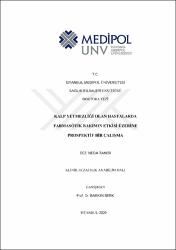| dc.contributor.advisor | Berk, Barkın | |
| dc.contributor.author | Taner, Neda | |
| dc.date.accessioned | 2021-08-18T08:42:59Z | |
| dc.date.available | 2021-08-18T08:42:59Z | |
| dc.date.issued | 2020 | en_US |
| dc.date.submitted | 2020-08-18 | |
| dc.identifier.citation | Taner, N. (2020). Kalp yetmezliği olan hastalarda farmasötik bakımın etkisi üzerine prospektif bir çalışma. (Yayınlanmamış doktora tezi). İstanbul Medipol Üniversitesi Sağlık Bilimleri Enstitüsü, İstanbul. | en_US |
| dc.identifier.uri | https://hdl.handle.net/20.500.12511/7854 | |
| dc.description.abstract | Bu çalışmanın amacı, kalp yetmezliği bulunan hastalarda klinik eczacının sunacağı farmasötik bakım hizmetleri kapsamında hasta eğitiminin ilaç uyuncuna, ilaçla ilgili problemler (İİP)'e ve yaşam kalitesine etkisini belirlemektir. Bu tez çalışmasında, İstanbul Medipol Üniversitesi Hastanesi'nde yatan 160 kalp yetmezliği hastası (çalışma grubu: 80 hasta; kontrol grubu: 80 hasta) klinik takibe alındı. Her iki grupta 'Morisky Ölçeği', 'SF-36 Yaşam Kalitesi', 'Farmasötik Bakım' anketi uygulandı ve PCNE V8.0 sınıflandırma sistemini kullanarak hastaların tedavi sırasında karşılaşılan ilaçla ilgili problemlerinin belirlenmesi, önlenmesi ve çözümlenmesindeki klinik eczacının rolü ve önemi değerlendirildi. 'Morisky Ölçeği' ile 6 ay sonunda her iki grup arasında tedaviye uyunç değerlendirildiğinde çalışma grubunda yüksek oranda uyunç sağlandığı sonucuna ulaşılmıştır. 'SF-36 Yaşam Kalitesi' anketinin sonuçlarına ilişkin genel sağlık değişim puanları kontrol ve çalışma grupları arasında anlamlı farklılık göstermektedir (p<0,05). 'Farmasötik Bakım' anketinin sonuçları 6. ay sonunda iki grupta da karşılaştırıldığında 'ilaç almayı unutma' (%2,9) ve 'ilacınızdan kaynaklanan herhangi bir yan etki yaşama' (%4,5) oranlarında çalışma grubunda önemli ölçüde iyileşme görülmektedir. Diğer sorunlar ile karşılaştırıldığında, tedavide kullanılan ilacın etkisizliği en yaygın (n=23; %28,75) ilaçla ilgili sorun olarak belirlenmiştir (p <0,001). Müdahale önerilerinin %72,5'i kabul edilmiş, %31,25 hastada problemin çözüldüğü saptanmıştır. Sonuç olarak, ilaca ilişkin sorunların hasta eğitimiyle çözülmüş olması önemli bir başarıdır. Çeşitli hastalıklara sahip bireylerin çoğunda ilaçla ilgili problemlere sık rastlanabilmektedir. Ancak tedavinin doğası gereği, kalp yetmezliği hastalarında, gelişme riski çok daha yüksek olarak bulunmuştur. | en_US |
| dc.description.abstract | The purpose of this study is to determine the effect of patient education on drug compliance, drug related problems (DRP) and, quality of life within the scope of pharmaceutical care services to be provided by the clinical pharmacist in patients with heart failure. In this thesis study, 160 heart failure patients (study group: 80 patients; control group: 80 patients) hospitalized in İstanbul Medipol University Hospital were followed up clinically. The 'Morisky Scale', 'SF-36 Quality of Life', 'Pharmaceutical Care' questionnaire was applied in both groups, and the role and importance of the clinical pharmacist in identifying, preventing and solving the drug-related problems encountered during the treatment of patients were evaluated using the PCNE V8.0 classification system. When the compliance with the treatment was evaluated between both groups at the end of 6 months with the "Morisky Scale", it was concluded that a high rate of compliance was achieved in the study group. The general health change scores related to the results of the "SF-36 Quality of Life" questionnaire differ significantly between the control and study groups (p <0.05). When the results of the "Pharmaceutical Care" questionnaire are compared in both groups at the end of the 6th month, a significant improvement is observed in the study group in the rates of "forget to take medicine" (2.9%) and "experiencing any side effects from your drug" (4.5%). Compared with other problems, the ineffectiveness of the drug used in the treatment was determined as the most common (n = 23; 28.75%) drug-related problem (p <0.001). 72.5% of the intervention suggestions were accepted, and the problem was found to be solved in 31.25% of the patients. In conclusion, it is an important success that problems related to medicine have been solved by patient education. Drug-related problems are common in most individuals with various diseases. However, due to the nature of the treatment, the risk of development has been found to be much higher in patients with heart failure. | en_US |
| dc.language.iso | tur | en_US |
| dc.publisher | İstanbul Medipol Üniversitesi Sağlık Bilimleri Enstitüsü | en_US |
| dc.rights | info:eu-repo/semantics/openAccess | en_US |
| dc.subject | Farmasötik Bakım | en_US |
| dc.subject | Hasta Eğitimi | en_US |
| dc.subject | İlaçla İlgili Sorunlar | en_US |
| dc.subject | Kalp Yetmezliği | en_US |
| dc.subject | Klinik Eczacılık | en_US |
| dc.subject | Pharmaceutical Care | en_US |
| dc.subject | Patient Education | en_US |
| dc.subject | Drug Related Problems | en_US |
| dc.subject | Heart Failure | en_US |
| dc.subject | Clinical Pharmacy | en_US |
| dc.title | Kalp yetmezliği olan hastalarda farmasötik bakımın etkisi üzerine prospektif bir çalışma | en_US |
| dc.type | doctoralThesis | en_US |
| dc.department | İstanbul Medipol Üniversitesi, Sağlık Bilimleri Enstitüsü, Klinik Eczacılık Ana Bilim Dalı | en_US |
| dc.relation.publicationcategory | Tez | en_US |


















